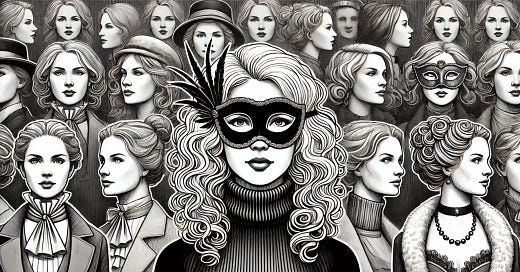Why Many Autistics Relate To Taylor Swift Lyrics: The Tortured Poet's Department Edition
A follow-up to my most-read post about all the autistic-relatable lyrics that speak to Autistic Swifties
Welcome to The Late Diagnosed Diaries, the musings of a late-discovered autistic author and speaker, former journalist, and eternally curious human
Late last year, I wrote what is now my most-viewed post, about the many ways that Taylor Swift’s lyrics and songwriting speak to the autistic experience.
Since then, we’ve been blessed with another musical masterpiece, The Tortured Poet’s Department (aka TTPD), so I’m revisiting the topic with the new manuscript in hand.
Here’s a link to the original post, in case you missed it or want a refresher:
On The Outside, Looking In (Or… Up)
The feeling of being different or “off” is common for autistics, and it’s a theme that appears time and again throughout Swift’s discography. TTPD was no different, with plenty of nods to being ostracized, mocked, or otherwise left out sprinkled throughout the album:
I didn’t opt in to be your odd man out (So Long London)
We can all just laugh until I cry (Who’s Afraid of Little Old Me)
A curious child, ever reviled by everyone except her own father (The Bolter)
Behind her back, her best mates laughed, and they nicknamed her ‘the bolter’ (The Bolter)
Were you making fun of me with some esoteric joke? (The Black Dog)
Little did you know your home’s really just a town that you’re a guest in (Florida)

But the outsider vibes were strongest for me in Down Bad, where Taylor is comparing the experience of having a loved one disrupt her peace and then disappear to an alien abduction:
Did you really beam me up?
In a cloud of sparkling dust
Just to do experiments on
Tell me I was the chosen one
Show me that this world is bigger than us
Then sent me back where I came from
A later verse offers a similar visual:
Did you take all my old clothes?
Just to leave me here naked and alone
In a field in my same old town
That somehow seems so hollow now
Most Swifties presume this song (like many on TTPD) is about Taylor’s brief but passionate pre-Travis relationship with 1975 frontman Matty Healy. His image and energy are quite a bit darker and more chaotic than Tay’s, and Swifties vehemently opposed pairing (To be clear, that is quite literally none of anyone’s business. Like, at all.)
Perhaps it’s that yearning for acceptance that inspired the Down Bad line, “I'll build you a fort on some planet, where they can all understand it,“ but I’d be willing to bet I’m not the only autistic to feel seen by the alien-adjacent references to being misunderstood and yearning for a place where people “get it.”
The autistic experience is often described in similar terms—An Anthropologist on Mars, anyone?—so it’s easy to put yourself in the song as someone who has likely found and then lost someone you connected with deeply, even if only for a short time.
For a moment, it might feel like you were “heaven struck,” but before you know it, you’re “waving at the ship“ while they leave you “safe and stranded,” and you find yourself “staring at the sky, ‘come back and pick me up’.“ #Relatable
Mastering Masking & Making Sense of Yourself
If I had to take a guess, I’d say that a neurodivergent listener of TTPD would probably feel most deeply seen by “I Can Do It With a Broken Heart,” which can easily be heard as an ode to autistic masking.
Of course, Taylor doesn’t use the word “masking” in ICDIWABH, but the song is entirely focused on how she was forced to put on a happy face during the depths of her post-breakup grief, hiding her feelings to preserve both others’ comfort and her public-facing image. And that’s pretty much a textbook description of the masking and camouflaging that many autistics are forced to do every day.
Starting at the end of the first verse and leading right into the chorus, Swift pulls no punches, diving right into the brutal dichotomy between her internal feelings and her external appearance:
…I can show you lies (one, two, three, four)
'Cause I'm a real tough kid, I can handle my shit
They said, "Babe, you gotta fake it till you make it" and I did
Lights, camera, bitch smile, even when you wanna die
He said he'd love me all his life
But that life was too short
Breaking down, I hit the floor
All the pieces of me shattered as the crowd was chanting "More"
I was grinning like I'm winning, I was hitting my marks
'Cause I can do it with a broken heart (one, two, three, four)
Throughout the song, Taylor repeats “You know you're good when you can even do it with a broken heart.“ Every time I hear it, I can’t help but think of the way that masking is rewarded in a neurotypical society, which not only incentivizes neuro-minorities to play along and put on a brave face, but also penalizes them when they don’t.
To be “good,” through this lens, can be interpreted as meeting the neurotypical expectation to hide your suffering, or to “pass” by meeting neurotypical expectations. “And I’m good,” she sings, “‘cause I’m miserable, and nobody even knows.”
(ICDIWABH also gets an honorable mention because “I cry a lot but I am so productive,” is the best description of how it feels when I’m cruising toward autistic burnout.)
No other track on TTPD feels as overtly referential to the masking experience as I Can Do It With A Broken Heart, we did get some lyrical nods in a few other tracks as well:
There’s a lot of people in town that I bestow upon my fakest smiles (But Daddy I Love Him)
I move through the world with a heart broken, my longings stay unspoken (The Black Dog)
Am I allowed to cry (Guilty As Sin)
I think some things I’d never say (The Tortured Poet’s Department)
Rivulets descend my plastic smile (My Boy Only Breaks His Favorite Toys)
All that masking makes it difficult for autistics to know who we really are. Many of us who are late-diagnosed go through a long and complicated process of trying to unpack which parts of our personality are real, which are masks, and which are trauma responses from a life lived undiagnosed. In Swift’s previous albums, we saw a lot more lyrics that could read as references to the unclear sense of self that many autistics experience as a result of masking, but TTPD has a few honorable mentions:
They said I was a cheat, I guess it must be true (Florida!!!)
They say what doesn’t kill you makes you aware, what if it becomes who you are? (Cassandra)
I changed into goddesses, villains, and fools, changed plans and lovers and outfits and rules. (Chloe or Sam or Sophia or Marcus)
If you wanna break my cold cold heart, Just say “I loved you the way that you were” (Chloe or Sam or Sophia or Marcus)
Decoding Everything (aka Effortful Existing)
We know Taylor Swift to be a huge lover of “easter eggs,” so much so that she admits to dropping clues years in advance, and even involving others in her puzzle-building schemes. TTPD brings about more relatable quotes about the experience of having to constantly search for hints and clues as you decode the world around you (and everyone in it) to varying degrees of effectiveness:
I’m afflicted by the not knowing (I Look in People’s Windows)
You had stopped and tilted your head, I still pondered what it had meant (I Look in People’s Windows)
I’m combing through the braids of lies (LOML)
You swore that you loved me, but where were the clues? (So Long London)
But since this album was written in the midst of a breakup, it’s no surprise that we see these themes echoed strongly throughout, with several songs seemingly dedicated to this theme, including LOML, The Smallest Man Who Ever Lived (TSMWEL), The Black Dog, Who’s Afraid of Little Old Me (WAOLOM), and How Did It End?
In these songs, Taylor is reflecting on a relationship that’s ended seemingly without appropriate warning or logical explanation, trying to understand what went wrong.
Since many autistics rely heavily on logic and bottom-up thinking, and may also have missed some of the subtler signs that a relationship is in decline, the feelings in these songs might feel particularly relatable for autistic listeners:
But I still don’t know, how did it end? (How Did It End?)
I can’t pretend like I understand, how did it end? (How Did It End?)
And it kills me, I just don’t understand (The Black Dog)
I still can’t believe it (The Black Dog)
Was any of it true? (TSMWEL)
You’ll confess why you did it (TSMWEL)
She’s not just wondering what went wrong, though. This particular flavor of reflection also involves a fear that you’ve been naive or were being taken for a fool. Perhaps there was something more sinister going on, more malicious, some lyrics seem to suggest:
What about your quiet treason? (Fortnight)
You said I needed a brave man, and proceeded to play him, until I believed it too (The Black Dog)
Was it hazing? (The Black Dog)
Did you take all my old clothes, just to leave me here naked and alone? (Down Bad)
A con man sells a fool a get-love-quick scheme (LOML)
I just want to know if rusting my sparkling summer was the goal. (TSMWEL)
'Cause you lured me, and you hurt me, and you taught me. You caged me and then you called me crazy. (WAOLOM)
Tell me everything is not about me. But what if it is? Then say they didn't do it to hurt me. But what if they did? (WAOLOM)
New & Next?
I wrote a whole paragraph about how it might be a while before we get any new music from TayTay to analyze for autistic relatability, given that she just wrapped the multi-year Eras Tour and probably wants to rest for like, a minute or two.
And then I remembered that she literally gave us the TTPD double album in the middle of said tour.
So who knows. Maybe next week.
But rest assured that if and when there’s new TSwift music, I will listen to it (and analyze it) autistically, and then infodump all about it here even more autistically.
Til next time.
Got another TTPD lyric that spoke to your autistic experience? Share it below!
Want to hear more? I joined the Hits Differently Podcast to talk about the autistic reliability of TSwift’s music and lyrics for their episode on World Autism Day. (My interview starts around the 5-minute mark)












